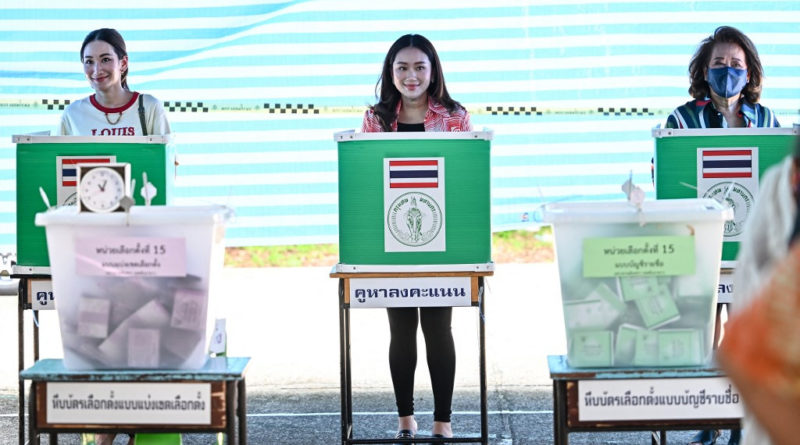OPINION-ACADEMIA | Thai elections raise red flag among neighboring dictators, generals
Paetongtarn Shinawatra (center), the prime ministerial candidate of the Pheu Thai Party, casts her ballot next to her mother Pojaman Na Pombejra (right) and sister Pintongta Kunakornwong at a polling station during Thailand’s general election in Bangkok on May 14, 2023. (AFP/Manan Vastyayana)
.
Kornelius Purba

Southeast Asia’s nondemocratic leaders, especially that of Myanmar’s junta, and even some military generals in Indonesia, are closely watching how far Thailand’s armed forces will tolerate the victory of the anti-military and anti-monarchical Move Forward Party (MFP) in the May 14 elections.
The Indonesian Military (TNI) must be keen to learn from its Thai counterpart how to expand its role in the world’s third largest democracy.
Considering its almost century-long control over domestic politics, Thailand’s military is very unlikely to simply cede power to the opposition. A drastic move to democracy by the Thai military, on the other hand, will send shockwaves through the region.
The MFP’s stunning victory is strong evidence that the Thai people, especially young voters, are fed up with the country’s two most powerful institutions: the monarchy and the armed forces.
The party won 151 seats while the Pheu Thai Party of former prime minister Thaksin Sinawatra, which was predicted to win by a landslide, secured only 141 seats to finish second. The other countries in the Mekong River Basin, Vietnam, Laos, and Cambodia and Myanmar, are following their neighbor’s political developments more carefully. The twin victory of Thailand’s opposition parties could mark a start to the waning power of the Thai military, which would directly impact the domestic politics of surrounding countries.
This would be of special concern for junta leader Gen. Min Aung Hlaing in Myanmar. Among the ASEAN member countries, Thailand under outgoing Prime Minister Prayuth Chan-ocha had been a constant supporter of the Myanmar junta, which seized power from the democratically elected government of Aung San Suu Kyi on Feb. 1, 2021.
For Hlaing, Prayuth is a role model: He toppled the democratically elected government of Yingluck Shinawatra in 2014 when he was the Thai Army chief, and manipulated the 2019 elections to stay in power.
More recently, Prayuth has defended Hlaing from ASEAN’s decision to exclude the junta leader and regime from the bloc’s official activities.
The end of Prayuth’s regime and the Thai military’s potential willingness to accept the opposition’s victory will be worrying for the Myanmar military, as it will lose its main backer in the region.
In Vietnam and Laos, communist parties hold absolute power, backed by the respective militaries of those countries. So does Hun Sen in Cambodia, where a formal opposition exists but is demolished as soon as it shows any signs of defying the ruling government.
Many believe that the Thai military has little choice but to accept democracy. Nowadays, Asia has seen almost no military coups, except in Yemen. Military takeovers remain commonplace only in Africa, while the practice is on the decline in Latin America.
Thailand is the largest economy among the region’s predominantly Buddhist nations. Since 1932, the Thai armed forces have launched 22 coups, 13 of which were successful. They have also revised the constitution 18 times to accommodate their interests.
MFP chairman Pita Limjaroenrat has declared his readiness to assume the prime ministership by forming a coalition with other opposition parties, and Pheu Thai has also expressed its readiness to form a coalition with the MFP.
According to Prayuth’s draft constitution, the prime minister is elected by the parliament, which has two chambers. The lower house comprises 500 elected legislators, and the upper house consists of 250 members who are directly appointed by the military. This means that Pita will need at least 376 votes to become prime minister, so the decision on who becomes prime minister rests with the military, not civilian voters.
Speaking to TNI officers now, especially from Army, it is easy to sense their discomfort or envy over the power of the National Police. They may also believe that the hegemony of the Thai military is too much to adopt in Indonesia, but agree that the overly regulated military should end.
For 32 years until his resignation on May 21, 1998, president Soeharto used the military effectively to preserve his near-absolute power. With its “dual function”, comprising social and political functions in one hand and security and defense in the other, the then-Indonesian Armed Forces (ABRI), especially the Army, held nearly all key posts in government at both national and regional levels.
Following the Soeharto regime’s downfall, the military pledged to gradually return to the barracks. The House of Representatives passed Law No. 34/2004 on the Indonesian Military (TNI) as the legal basis for reinstating the military’s role in purely external security and national defense. TNI members, like police personnel, cannot vote or run for public office unless they have retired.
Under the 2004 law, TNI members may hold civilian positions at only 10 ministries and state institutions. These include the posts of coordinating political, legal and security affairs minister, the presidential military secretary, the head of the State Intelligence Agency (BIN) and the head of National Cyber and Encryption Agency (BSSN), as well as jobs at the National Resilience Institute (Lemhannas), the Defense Ministry, the National Search and Rescue Agency (Basarnas), the National Narcotics Agency (BNN) and the Supreme Court.
Recently, a draft amendment to the TNI Law suggests that the military wants to expand its civilian roles to at least eight additional posts, including the posts of coordinating maritime affairs and investment minister, fisheries and maritime affairs minister and chief of staff.
An opinion piece published in The Jakarta Post on May 19 suggests that “the proposed revisions position [the] TNI as the state’s tool in not only defense, but also security matters”, and that this could lead to jurisdictional overlap with the National Police.
Thai army chief Gen. Narongpan Jitkaewthae, who will retire this year, has promised to accept the election results, whatever that may be. But the Thai military has been quick to change its mind in the past.
Today, it is the military rather than the monarch that has the final say on almost all aspects of life in Thailand. Many expect the country’s generals will let democracy flourish, but this might turn out to be just wishful thinking.
The Thai military will not change much, and the TNI is clearly indicating that it wouldn’t mind enjoying some of the economic and political privileges given to its Thai counterpart.
***
The writer is a senior editor at The Jakarta Post.
.
 Ads by: Memento Maxima Digital Marketing
Ads by: Memento Maxima Digital Marketing
@[email protected]
SPACE RESERVE FOR ADVERTISTMENT
The Jakarta Post, Jakarta
● Sat, May 20, 2023


 Memento Maxima Digital Marketing
Memento Maxima Digital Marketing







